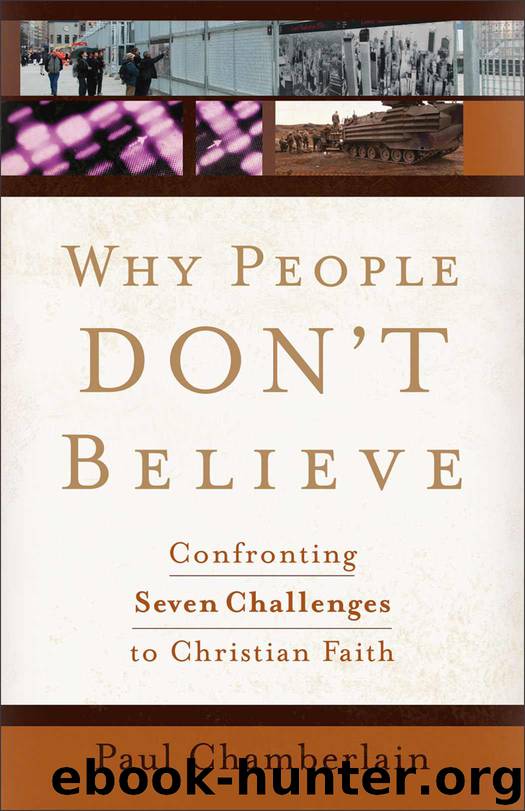Why People Don't Believe: Confronting Seven Challenges to Christian Faith by Chamberlain Paul

Author:Chamberlain, Paul [Chamberlain, Paul]
Language: eng
Format: epub
Tags: REL067030
ISBN: 9781441232090
Publisher: Baker Publishing Group
Published: 2011-05-01T00:00:00+00:00
Could There Be Too Much Evidence?
Swinburne’s offending statement was made during a discussion about the existence of God when he was asked how much evidence exists for theism. His answer, as we noted earlier in this book, was that “there is quite a lot of evidence anyway of God’s existence, and too much might not be good for us.”[114] Dawkins is dumbfounded by this statement. Too much evidence might not be good for us! How can too much evidence for anything be bad—especially for a claim as momentous as that God exists? As far as he is concerned, this statement betrays a bizarre and hostile attitude toward evidence itself. He is so astounded by it that he repeats it in italics and calls his readers to read it again and think about how absurd it is.
To understand Dawkins’s astonishment at Swinburne’s statement, it is necessary to know that Dawkins has maintained throughout his writings that the question of God’s existence is not, in principle, an insurmountable problem. In The God Delusion he contends it could be easily settled by God himself, assuming he exists, if he simply decided to do so. He could clinch the argument noisily and unequivocally in his favor if he wanted to.[115] In Dawkins’s words, “If God existed and wanted to convince us of it, he could ‘fill the world with super-miracles.’ ”[116] No wonder then that he is astounded that anyone would claim that the very thing that could settle the matter, namely more evidence, might not be good for us. It points to a deep hostility toward evidence within religion, says Dawkins.
Why would Swinburne utter this remark? To understand it, we must see it as part of an ongoing discussion over the past few hundred years among theologians and philosophers. It is a discussion Dawkins is obviously unaware of but which he would have been wise to inquire into before voicing such incredulity. Had he done so, he would have gained some idea why a person with Swinburne’s impressive credentials and achievements, something Dawkins himself alludes to, would make such a statement.
In brief, the discussion centers on the question of human freedom and the choice to believe in God. In the field of philosophy, freedom is a concept that is discussed widely and defined differently, usually with important consequences for other matters. Additionally, there is more than one kind of freedom humans can be said to possess. Freedom of the will refers to a person’s ability to act in a way that is uncoerced, while freedom of the intellect, sometimes called epistemic freedom, refers to a person’s ability to think or believe in a way that is uncoerced.
Swinburne’s comment about too much evidence relates to both kinds of freedom. Some Christian philosophers and theologians have strongly emphasized the point that God is committed to ensuring we are genuinely free as we make the choice of whether to believe in him. In order to guarantee this freedom to believe, he sees to it that people who do not want to believe in him are not forced to do so by overpowering evidence.
Download
This site does not store any files on its server. We only index and link to content provided by other sites. Please contact the content providers to delete copyright contents if any and email us, we'll remove relevant links or contents immediately.
The Secret Power of Speaking God's Word by Joyce Meyer(3175)
Signature in the Cell: DNA and the Evidence for Intelligent Design by Stephen C. Meyer(3125)
Real Sex by Lauren F. Winner(3014)
The Holy Spirit by Billy Graham(2944)
The Gnostic Gospels by Pagels Elaine(2527)
Jesus by Paul Johnson(2352)
Devil, The by Almond Philip C(2324)
23:27 by H. L. Roberts(2245)
The Nativity by Geza Vermes(2226)
Chosen by God by R. C. Sproul(2160)
All Things New by John Eldredge(2158)
Angels of God: The Bible, the Church and the Heavenly Hosts by Mike Aquilina(1954)
The Return of the Gods by Erich von Daniken(1929)
Angels by Billy Graham(1922)
Knowing God by J.I. Packer(1852)
Jesus of Nazareth by Joseph Ratzinger(1811)
The Gnostic Gospel of St. Thomas by Tau Malachi(1788)
Evidence of the Afterlife by Jeffrey Long(1784)
How To Be Born Again by Billy Graham(1775)
